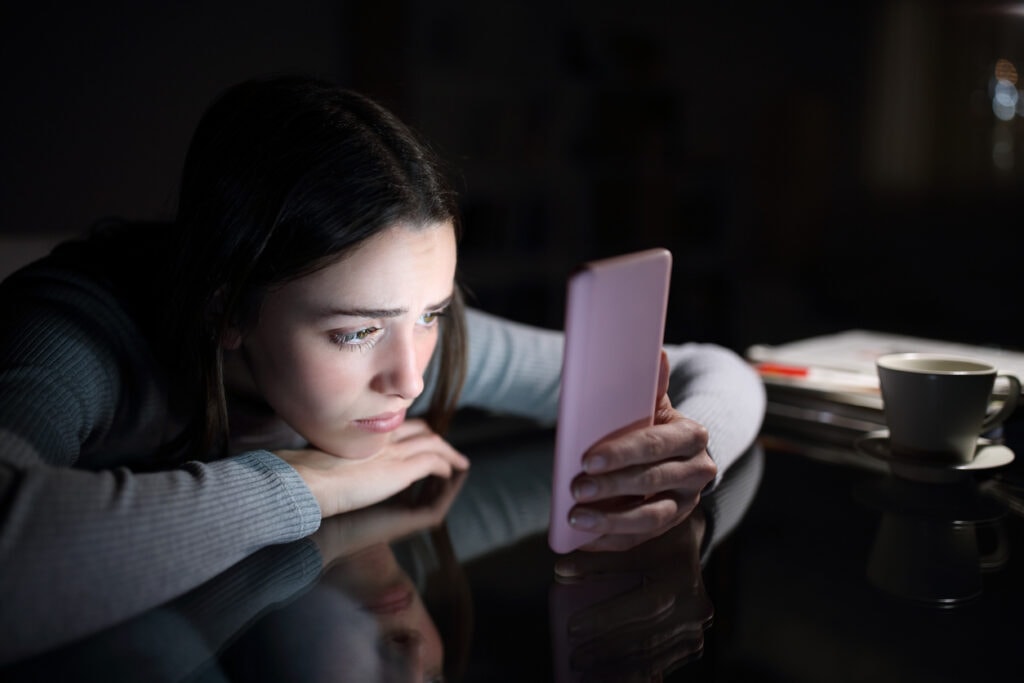Spending too much time in front of screens, from phones, computers to televisions, is increasingly seen as a factor that increases the risk of depressive symptoms, especially in girls.
The main reason given is that this habit negatively affects the quality and duration of children's sleep, a key factor in maintaining mental health.

According to the World Health Organization (WHO), depression is a common mental disorder, affecting approximately 5% of the global adult population. Notably, among adolescents, depression is considered one of the leading causes of disease burden.
WHO also warns that about 14% of children and adolescents aged 10 to 19 are living with mental health disorders.
However, the majority of these cases remain undetected or undertreated, partly due to lack of knowledge and awareness of the signs and causes of these diseases.
Recently, a group of researchers conducted a large-scale study in Sweden, following more than 4,800 students aged 12 to 16 for 1 year.
The study was divided into three different phases to record data on time spent using electronic devices, sleep quality and quantity, as well as symptoms related to depression in this group of subjects.
The results showed that students who spent more time using screens tended to go to bed later and had more difficulty maintaining quality sleep. In other words, the more time spent using electronic devices, the more sleep was affected, leading to mental health problems.
Researchers also note that blue light emitted from screens, a type of short-wavelength light, is one of the biggest culprits.
According to Harvard Medical School (USA), although blue light can help people stay awake and more focused during the day, at night it seriously disrupts the body's circadian rhythm.
Specifically, blue light can inhibit the production of melatonin, a hormone that supports sleep, causing the body to mistakenly think that it is still in a "wake" state, thereby delaying the process of falling asleep and disrupting the entire natural sleep-wake cycle.
“We found that screen time tends to push bedtimes later, and that it disrupts multiple aspects of the biological system that controls human sleep at the same time,” the researchers wrote.
When the scientists looked deeper, they found significant differences between boys and girls. In boys, excessive screen use was directly linked to depressive symptoms after 12 months.
In girls, meanwhile, the link was indirect, with negative impacts on sleep acting as a “bridge” between device use and increased risk of depression.
In other words, in girls, it is sleep disruptions such as insufficient sleep, late bedtimes, or poor sleep quality that make depressive symptoms worse.
This suggests that to protect children's mental health, especially teenage girls, controlling screen time and establishing healthy sleep habits is crucial.

Researchers have found that sleep quality and duration may mediate the relationship between screen use and depressive symptoms in girls.
Specifically, they estimated that sleep-related factors could explain 38% to 57% of the negative impact of screen time on depression in this population.
“In this study, we found that adolescents who reported prolonged screen use were more likely to develop poor sleep habits over time, such as going to bed late, not getting enough sleep, or having disrupted sleep patterns. These long-term decreases in sleep quality contributed to increased symptoms of depression, which were particularly pronounced in girls,” the researchers wrote.
The findings add to concerns among experts and health professionals about the increasing amount of time children and teenagers spend in front of screens, from smartphones and tablets to computers and televisions.
The findings are also in line with the latest recommendations from the Swedish Public Health Agency, which emphasizes that teenagers should limit their use of electronic devices to no more than two to three hours a day to protect their mental and physical health.
Reducing device use, especially among adolescent girls, may be significantly effective in reducing the risk and severity of depressive symptoms, according to researchers.
In other words, controlling screen time not only helps improve sleep quality but is also an important measure to prevent serious psychological problems in adolescents in the context of modern society increasingly dominated by technology.
Source: https://baonghean.vn/dien-thoai-di-dong-lam-tang-nguy-co-mac-cac-trieu-chung-tram-cam-10294556.html



![[Photo] Prime Minister Pham Minh Chinh meets with the Policy Advisory Council on Private Economic Development](https://vphoto.vietnam.vn/thumb/1200x675/vietnam/resource/IMAGE/2025/5/8/387da60b85cc489ab2aed8442fc3b14a)
![[Photo] National Assembly Chairman Tran Thanh Man chairs the meeting of the Subcommittee on Documents of the First National Assembly Party Congress](https://vphoto.vietnam.vn/thumb/1200x675/vietnam/resource/IMAGE/2025/5/8/72b19a73d94a4affab411fd8c87f4f8d)
![[Photo] President Luong Cuong presents the decision to appoint Deputy Head of the Office of the President](https://vphoto.vietnam.vn/thumb/1200x675/vietnam/resource/IMAGE/2025/5/8/501f8ee192f3476ab9f7579c57b423ad)

![[Photo] General Secretary concludes visit to Azerbaijan, departs for visit to Russian Federation](https://vphoto.vietnam.vn/thumb/1200x675/vietnam/resource/IMAGE/2025/5/8/7a135ad280314b66917ad278ce0e26fa)

















































![[Photo] Prime Minister Pham Minh Chinh talks on the phone with Singaporean Prime Minister Lawrence Wong](https://vphoto.vietnam.vn/thumb/402x226/vietnam/resource/IMAGE/2025/5/8/e2eab082d9bc4fc4a360b28fa0ab94de)






























Comment (0)